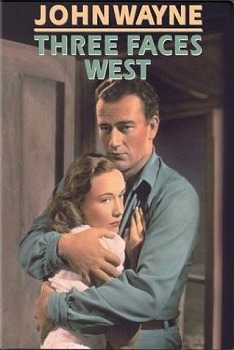| Three Faces West | |
|---|---|
 DVD cover | |
| Directed by | Bernard Vorhaus |
| Written by | F. Hugh Herbert Joseph Moncure March Samuel Ornitz |
| Produced by | Sol C. Siegel |
| Starring | John Wayne Sigrid Gurie Charles Coburn |
| Cinematography | John Alton |
| Edited by | William Morgan |
| Music by | Victor Young |
Production company | Republic Pictures |
| Distributed by | Republic Pictures |
Release date |
|
Running time | 79 minutes |
| Country | United States |
| Language | English |
Three Faces West is a 1940 American drama film directed by Bernard Vorhaus and starring John Wayne, Sigrid Gurie and Charles Coburn. [1]
Contents
The film, mainly set in North Dakota was one of a handful of overtly anti-Nazi films produced by Hollywood before American entry into World War II. [2] Isolationists and Nazi sympathizers condemned other Hollywood movies for being pro-British "propaganda" or for "glorifying war", however Three Faces West was deliberately crafted to celebrate the pioneer spirit of America, and the determination of Americans to survive the dust bowl, and contrasted these values with the evils of Nazism, thus preventing isolationists and Nazi sympathizers from being able to criticize the film as they had criticized other anti-Nazi films during this period. [3]
Writing in the Journal of Austrian-American History , Jacqueline Vansant has argued that the film "takes a bold stand on contemporary issues through its Austrian-American romance." [4]